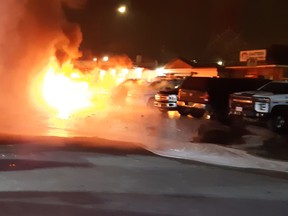First Nations Eco-Terrorism in Canada's Oilfields
"[Get involved in] decolonial solidarity actions [designed to halt the final stages of drilling at the Coastal GasLink site; calling on] anarchist groups [and] climate activists [to mobilize by November 5 to] kill the drill.""It's time to plan, prepare and protect what is left."Molly Wickham, Gidimt'en Clan"We do not need 'warriors' from other First Nations or non-Wet'suwet'en protesters to protect us or speak for us, especially when so many Gidimt'en and so many Wet'suwet'en do not support them."Letter by members of the Gidimt'en Clan"[The activists] have never consulted us [the elected leadership] about their actions and cannot claim to represent us or any other member of the First Nation."Chief Maureen Luggi, Wet'suwet'en leadership
 |
| Coastal GasLink installs pipe along its planned 670-kilometre route from northeastern B.C.'s gas fields to an LNG export terminal in Kitimat, B.C. (Coastal GasLink) |
In November of 2021 a blockade was perpetrated by activists claiming they were 'land defenders' representing an anti-pipeline faction of the Wet'suwwet'en First Nation. Their protest revolved around the Coastal GasLink project, a 670-kilometre-long pipeline under construction meant to supply LNG Canada with natural gas from north-eastern British Columbia. The pipeline to run from the Dawson Creek area to LNG Canada's facility in Kitimat, B.C.
The elected leadership of the Wet'suwet'en has repeatedly condemned the actions of the 'land defenders'. They signed agreements with the Coastal GasLink project, seeing it as a way that First Nations could prosper through employment and look forward to sharing the profits inherent in the ongoing need for energy products through natural resource extraction on First Nations hereditary land.
Members of the Gidimt'en Clan also decried the rise of anti-pipeline violence within their traditional territory. Hereditary leaders of the clans claim to have the authority to make such decisions as to object to the development of oil and gas extraction, whom the elected leaders accuse of interference in the governing affairs of the First Nations bands prepared to work for the projects and to share in their profits.
 |
| Machinery Coastal GasLink says was damaged near its Morice River drill pad near Houston, B.C., on Feb 17, 2022. RCMP has released video of suspects in the alleged attack. (Coastal GasLink) |
Back on February 17, some twenty to forty assailants wielding axes descended on Coastal GasLink's Morice River drilling site. In the dark of night they hijacked heavy equipment and battered other heavy industrial equipment to the tune of several million dollars on vehicles and onsite structures. Security staff with Coastal GasLink told of their work trucks surrounded by parties of masked figures bashing the vehicles with hatchets.
 |
| A picture on the Coastal GasLink website shows a damaged trailer on the construction site in northern B.C. Neither RCMP nor CGL have officially commented on a motive for the attack. (Coastal GasLink) |
When RCMP first responders attempted to approach the scene, they were delayed from reaching the site by encountering newly-felled trees blocking the roadways, and seeing shadowy figures who began pelting them with smoke bombs from behind the treeline. Three months before that attack the Morice River drill site saw a coordinated illegal blockade that stranded up to 500 workers at the camp, unable to leave or to access badly needed supplies.
 |
| A blockade set up by the Gidimt'en Clan in 2019 to stop access to pipeline workers. The blockades erected this week have cut off more than 500 workers, Coastal GasLink says. (Michael Toledano) |
Finally they were freed by a "rescue and enforcement" mission by the RCMP, dismantling the protest camps and clearing away obstructions. Some of the obstruction/barricadess were in fact commandeered heavy equipment from the site itself. Since then, the attackers of the February event have not struck again.
In the same region of Interior British Columbia, coordinated attacks on targets linked to Coastal asLink pipeline saw arsonists on Wednesday strike a parking lot full of RCMP vehicles. Before dawn, a number of vehicles were set on fire in the parking lot of the Sunshine Inn in Smithers, B.C. Once firefighters extinguished the blaze, it was discovered that eight vehicles were destroyed, including fouu that were marked RCMP cruisers, and a provincial ambulance.
"This appears to be a targeted attack on emergency services vehicles. Preliminary investigation indicates this is an arson", a statement by RCMP spokeswoman Cpl. Madonna Saunderson advised. The hotel where the vehicles were set on fire is located about an hour's drive from a Coastal Gas Link work camp, the subject of numerous legal blockades as well as that infamously violent midnight attack.
 |
Labels: Blockades, Coastal GasLink, First Nations Bands, Northern British Columbia, Oil-Patch Eco-Terrorism
0 Comments:
Post a Comment
<< Home